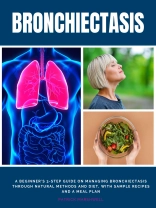Bronchiectasis is a lung condition that lasts for a long time and is chronic. In the United States alone, it’s believed that about 500, 000 of the population suffer from it.
As for the older demographic, out of 150 people aged 75 and older, one of them has bronchiectasis. It creates inflammation in the airways and can damage them. It may then become difficult to breathe as a result of the accumulation of mucus that this may cause. Bronchiectasis has been linked to an increased likelihood of contracting various respiratory illnesses.
There is currently no known treatment that will reverse the effects of bronchiectasis; however, there are medicines that can assist to manage the condition and alleviate its symptoms. These include going to frequent physiotherapy sessions, taking antibiotics to prevent infections, and adopting adjustments to one’s lifestyle such as giving up smoking and minimizing exposure to irritants. Other treatments may also be prescribed.
People who have bronchiectasis should also focus on maintaining a nutritious diet, as this can assist to strengthen the immune system and decrease inflammation. Antioxidant foods, foods high in omega-3 fatty acids, and foods high in vitamin C are particularly good for one’s health.
Bronchiectasis is an illness that can be debilitating, but it is possible to live a life that is relatively normal with the proper therapy and by making adjustments to one’s lifestyle.
In this beginner’s quick start guide, we will discuss bronchiectasis in more detail, including its causes, symptoms, and treatment options. We will also provide a 3-step guide on how to manage the condition through diet and lifestyle changes.
You will discover…
- All there is to know about bronchiectasis
- Symptoms and risk factors of bronchiectasis
- Diagnosing and treating the condition
- Different ways to manage bronchiectasis
- Diet plan that’s bronchiectasis friendly
Table of Content
Introduction
What Is Bronchiectasis?
Symptoms of Bronchiectasis
Diagnosing and Treating Bronchiectasis
A 3-Step Guide on Managing Bronchiectasis
Sample Meals
Conclusion
FAQ about Bronchiectasis
Key Takeaways
References and Helpful Links












